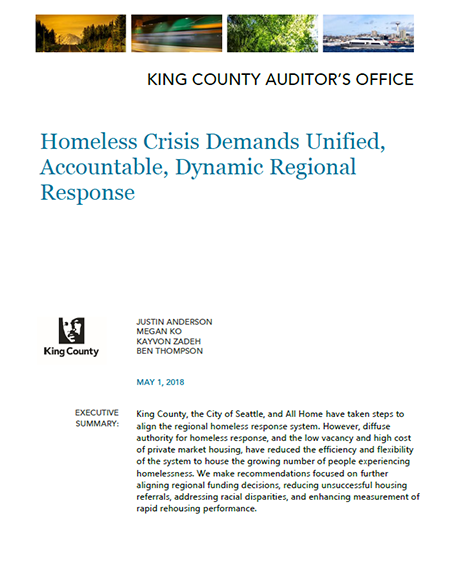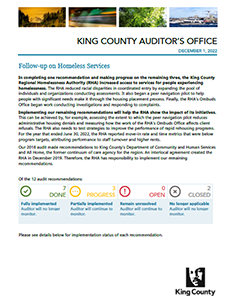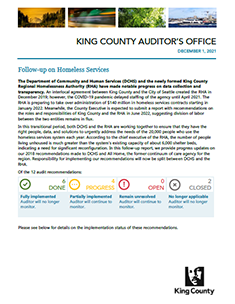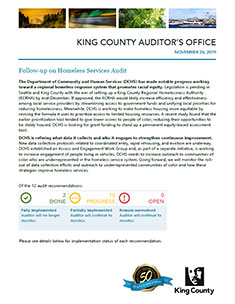Homeless Crisis Demands Unified, Accountable, Dynamic Regional Response
May 1, 2018
NEW! Download the latest follow-up report
Diffuse authority and loose coordination among local funders make it difficult for the regional homeless response system to adjust and respond to the needs of the growing number of people experiencing homelessness in King County. The main local funders of homeless interventions are the City of Seattle, King County, the King County and Seattle Housing Authorities, and private foundations. The City and County separately manage their funding and contracting processes, presenting administrative and operational burdens for homeless housing providers. Having many large organizations working independently also reduces the ability of the region to respond collectively to community needs, and creates roadblocks to change. All Home is a coordinating body meant to pull together local funders into a homeless response system, but it lacks the authority to do it.
Status
Of the 12 recommendations:
| DONE | 7 | Recommendations have been fully implemented. Auditor will no longer monitor. |
|---|---|---|
| PROGRESS | 3 | Recommendations are in progress or partially implemented. Auditor will continue to monitor. |
| OPEN | 0 | Recommendations remain unresolved. Auditor will continue to monitor. |
| CLOSED | 2 | Recommendation is no longer applicable. Auditor will no longer monitor. |
Summary
King County and the City of Seattle declared homelessness a state of emergency in 2015. Since then the number of people experiencing homelessness has continued to rise. In January 2017, the nationally mandated one-night count found 11,643 people experiencing homelessness. Committed to making homelessness rare, brief, and one time, King County is serving more people than ever. However, as homelessness becomes more common, waits for housing get longer. This audit explores several aspects of the regional homeless system, including how it is organized and how people enter and exit homelessness.
Local funders—the City of Seattle, King County, and United Way of King County—have worked to increase system consistency, but diffuse authority still hinders regional homeless response. Separate funding and contracting processes burden homeless housing providers, and funder autonomy slows programmatic changes that would respond to community needs. Despite its role as a coordinating body, All Home lacks the authority to unify local funders into an efficient and nimble crisis response system.
The Department of Community and Human Services (DCHS) manages the local coordinated entry system (CEA), but scarce housing and communication barriers have led to extended waits for housing through the system. Unsuccessful housing referrals are common, and, at times, disproportionately affect the most vulnerable. CEA has expanded its outreach, but racial disparities remain.
Local funders have increased investments in rapid rehousing (RRH). However, the limited number of affordable rental units has likely contributed to substandard RRH performance, with fewer than half of RRH enrollees moving into housing while participating in the program. While move-in rates have improved in 2017, more consistent tracking and analysis of data to identify potential housing barriers could improve these results.
We recommend that DCHS work with All Home and local funders on a formal, binding process to align funding decisions, and that DCHS use CEA data to identify improvements to the homeless system, reduce unsuccessful housing referrals, and address racial disparities in the system. We also recommend that DCHS work with All Home and local funders to ensure that RRH move-in rates and the number of RRH enrollees evicted or moving out of King County are tracked.
Reports related to this audit
Currently, there are no related reports to this project.
Audit team
Justin Anderson, Megan Ko, Kayvon Zadeh, and Ben Thompson conducted this audit. If you have any questions or would like more information, please call the King County Auditor's Office at 206-477-1033 or contact us by email KCAO@kingcounty.gov.

 Translate
Translate



